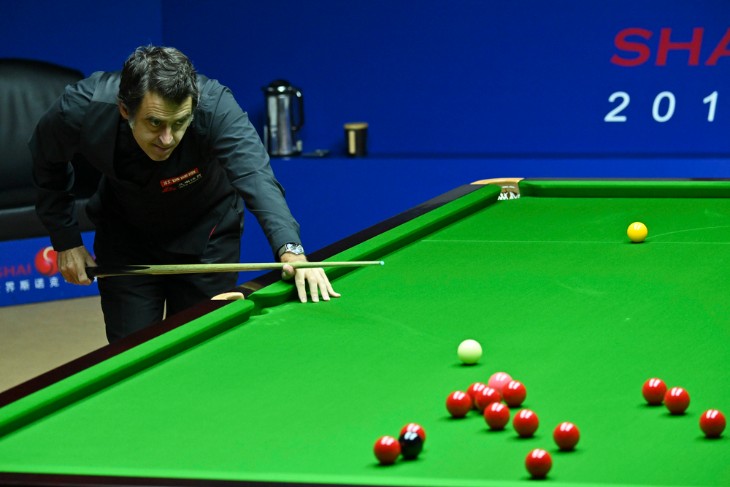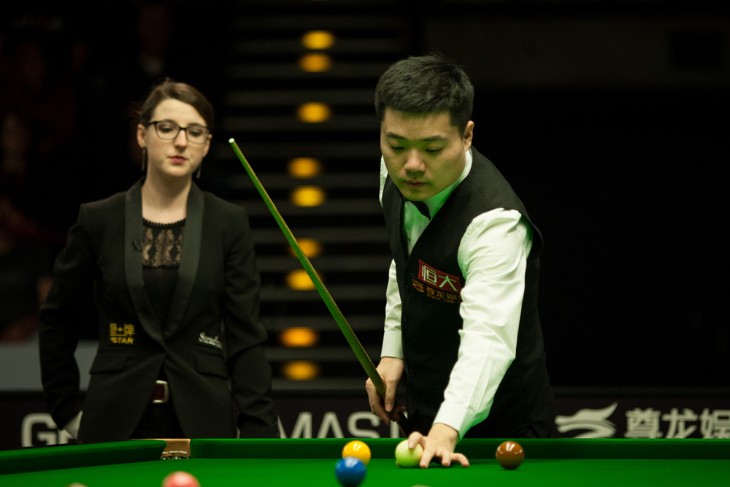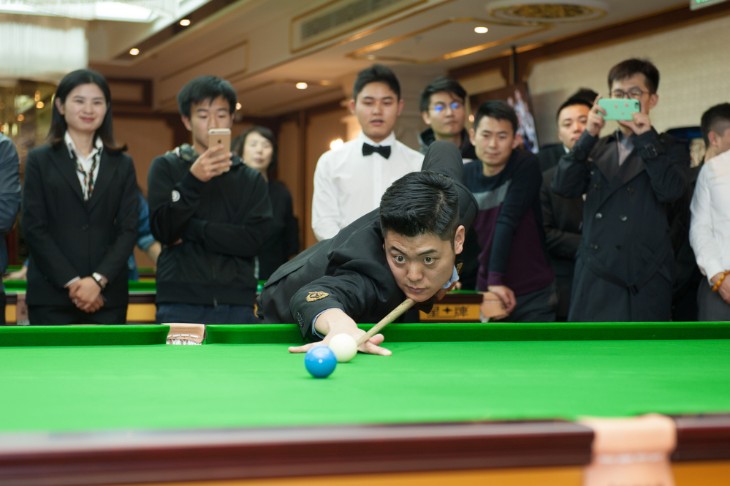In professional snooker, mastering the game requires a disciplined and holistic training approach. Professional players invest considerable time in honing their skills, which goes beyond just potting and cue control. Their training encompasses technical accuracy, mental strength, physical fitness, strategic practice, and analytical thinking. These diverse aspects are crucial for their success, enabling them to thrive in high-pressure environments and excel at the highest level. This exploration delves into the key components of these training routines that drive players to reach their peak performance.
Technical Practice
Technical practice is essential in snooker, focusing on mastering key skills for accurate and consistent play. A major part is potting, where players practice pocketing balls from different distances and angles, including long, mid-range, and close-range shots. This improves muscle memory and technique, crucial for potting under match pressure.
Cue ball control is another vital part of practice. Players work on various shots like stun, screw, and side spins to control the cue ball's position after potting, crucial for setting up subsequent shots and break-building.
Safety play, including defensive tactics and snookers, is also integral. Practicing escape shots from snookers helps players handle difficult positions and regain game control. A broad range of safety shots is key for strategic play in challenging frames.
Professional players spend countless hours perfecting potting, cue ball control, and safety shots. Mastering these technical aspects boosts their gameplay, confidence, and ability to face challenges in high-stakes tournaments. Consistent, focused technical practice lays the foundation for success in competitive snooker.
Safety Shots and Snookers
Safety shots and snookers are pivotal in strategic snooker play, often determining the outcome of a match.
Safety shots are defensive tactics where a player positions the cue ball to leave the opponent in a challenging situation, thereby maintaining control. These shots aim to restrict the opponent's options, making it hard for them to pot or prepare for an easy subsequent shot. Techniques include positioning the cue ball behind other balls, creating distance with the cushion, or hiding the cue ball behind a coloured ball to limit the opponent's shot choices.
Snookers, in contrast, are situations where a player intentionally leaves the opponent unable to directly hit any balls. This forces the opponent to execute complex shots to escape the snooker, potentially leading to penalty points if they fail. Professional players often create intricate snookers, complicating the opponent's escape and preventing easy potting opportunities.
Mastering safety shots and snookers demands an in-depth understanding of angles, ball trajectories, and cushion rebound patterns, along with exceptional cue ball control. Employing these techniques strategically can psychologically unsettle opponents, prompting errors and creating scoring opportunities. These defensive skills are crucial in high-level snooker, demonstrating a player's tactical acumen and game control ability.

Break Building
Break building is a key skill in professional snooker, involving potting a series of balls in succession while expertly controlling the cue ball's position. The goal is to accumulate a high score through consecutive potting, requiring not just potting ability but also superior cue ball control, accurate positioning, and forward planning.
Professionals plan their breaks with precision, analyzing the table's layout, ball positions and colours, and strategizing the best sequence for potting. This includes skillfully breaking up clusters of red balls to create new potting opportunities, enhancing the potential score of the break.
Effective break building involves not just splitting packs of balls but also maintaining optimal cue ball positioning after each shot for easier subsequent pots. This skill is about more than just scoring; it exerts psychological pressure on the opponent, compelling them to respond to a growing deficit.
A player's ability to build substantial breaks is a testament to their technical skill, strategic foresight, and ability to maintain composure under pressure. Executing a significant break can change a match's momentum, giving the player a decisive lead and dictating the game's tempo.
Mental and Concentration Training
Mental and concentration training are crucial in professional snooker, a sport characterized by lengthy, intense matches that demand high mental endurance. Players invest significant time in strengthening their mental toughness and concentration to remain focused in high-pressure scenarios. A common technique is visualization, where players mentally simulate shots, matches, and game situations. This practice enhances their quick decision-making during actual gameplay.
Additionally, mindfulness and relaxation methods are key components of a snooker player's mental training. Maintaining composure, particularly in critical match moments, is vital. Techniques like deep breathing, meditation, and other relaxation strategies help manage stress and anxiety, ensuring clear thinking and precise shot-making even in tense situations. Developing a calm and composed mindset helps players navigate the game's highs and lows and recover from challenges.
Mental training also involves building resilience and self-confidence. Players learn to handle mistakes and adverse circumstances, maintaining mental strength throughout a match. Positive self-talk and confidence exercises reinforce belief in their skills, boosting performance.
Incorporating mental and concentration training, professional snooker players enhance their technical abilities and develop the mental resilience essential for succeeding in high-stakes competitions. A strong mental game aids in maintaining focus, strategizing effectively, and executing shots accurately, providing a substantial edge over competitors.
Physical Fitness
Physical fitness, while often overlooked in snooker, is essential for a player's performance and endurance, particularly in long, mentally challenging matches. Snooker may not be intensely physical, but a certain fitness level is necessary for sustaining concentration and mental sharpness throughout a game or tournament.
Hand-eye coordination exercises are critical in snooker training. Players engage in activities to improve this skill, such as juggling and reaction time drills, enhancing their precision in potting and cue ball control.
Endurance and stamina are also crucial for snooker players. The mental and emotional demands of competitive play can be draining, so maintaining cardiovascular health through exercises like running, cycling, or swimming is important. Better stamina helps players stay mentally alert and focused, especially in prolonged matches or tournaments.
Physical fitness also helps prevent fatigue and injury, ensuring consistent peak performance. By integrating fitness routines into their training, snooker players improve their endurance, concentration, and hand-eye coordination, which can give them an advantage in the game.
Match Simulation
Match simulation is a fundamental training technique in professional snooker, serving to replicate real game conditions and enhance player skills and strategies. The technique involves:
- Engaging in Practice Matches: Players participate in practice matches that closely mimic tournament situations. This helps in honing techniques, decision-making abilities, and mental composure.
- Playing Against Skilled Opponents: Simulated matches are typically conducted against skilled opponents, practice partners, or even against oneself. This creates a competitive environment where players can test their proficiency under pressure.
The key benefits of match simulation include:
- Refinement of Tactical Approaches: Players use this opportunity to experiment with different styles of play, practice both defensive and attacking strategies, and learn to respond to various game situations.
- Development of a Versatile Playing Style: By simulating diverse scenarios, players adapt their game plans. This makes them better prepared for the unpredictability of actual matches.
Moreover, match simulations serve as a platform for:
- Assessing and Enhancing Mental Resilience: Facing challenging situations, handling pressure, and managing nerves are vital in professional snooker. Simulated matches teach players to control emotions, maintain focus, and make critical decisions under stress.
- Performance Analysis for Improvement: Analyzing performances in these simulations helps players identify areas needing refinement in their techniques and strategies.
In summary, match simulation plays a pivotal role in preparing snooker players for competitive tournaments. It ensures they enter matches with confidence, skill, and a deep understanding of their game, emphasizing the importance of practical experience in high-pressure situations.
Analysis and Feedback
Analysis and feedback are critical components in a snooker player's path to improvement and excellence. Professional players use video analysis extensively to review their matches and practice sessions. This enables them to spot strengths and weaknesses and areas requiring improvement. By examining their shots, body language, and decision-making, they gain insights that help refine their performance.
Expert feedback from coaches, mentors, or peers is also essential. Coaches offer specialized advice on techniques and strategies, highlighting areas that need development and recommending drills to enhance skills. Regular feedback sessions allow players to monitor their progress, ensuring their training is effective.
Self-assessment is another key aspect. Players reflect on their mental state, confidence, and emotional control during games. Understanding patterns in their play aids in developing a deeper game comprehension, guiding them to adjust their approach as needed.
Incorporating analysis and feedback into training equips snooker players with the knowledge to improve their gameplay. This ongoing cycle of review and adaptation is crucial in refining skills, bettering strategies, and boosting overall performance, ultimately aiding in achieving success in competitive snooker.

Routine and Consistency
In the training regimen of professional snooker players, two foundational principles stand out: routine and consistency. These principles are essential for both technical and mental preparation:
1. Structured Routine for Discipline and Organization:
- A structured routine provides players with discipline and purpose in their training.
- It helps organize training sessions effectively, ensuring that players cover all necessary aspects of their game.
2. Consistent Practice Enhances Skills:
- Consistency in practice routines improves technical skills and builds muscle memory.
- Muscle memory enables players to execute shots with precision and confidence during competitive matches.
- Regular and focused practice sessions are crucial for mastering potting, cue ball control, and safety play.
3. Mental and Emotional Consistency:
- Players must maintain a steady mindset regardless of wins or losses.
- Handling victories with grace and defeats with resilience is vital for long-term motivation and focus.
- Cultivating mental consistency allows players to approach every match with a clear and composed state of mind, crucial for making strategic decisions under pressure.
4. Physical Well-being through Routine:
- Snooker requires long hours of practice in a sedentary position.
- Maintaining physical fitness through regular exercise and healthy routines ensures players have the stamina to endure lengthy matches and tournaments without succumbing to fatigue.
In summary, a well-structured routine and unwavering consistency form the bedrock of a professional snooker player's success. By adhering to a disciplined training regimen and maintaining mental and physical consistency, players can continually refine their skills, make strategic improvements, and sustain peak performance on the snooker table. These principles are the cornerstones of excellence in the world of snooker.
Summary
In professional snooker, achieving success is a result of a diligent mix of skill, mental strength, physical fitness, and dedication. Players invest in extensive practice to perfect potting, cue ball control, and defensive strategies. Mental training enhances their focus and decision-making, while physical fitness ensures endurance during demanding matches. Simulations and analytical feedback refine their tactics, sharpening their competitive edge. This disciplined approach and consistency are vital in building the resilience needed to handle the sport's challenges. These efforts form the foundation of their pursuit of excellence, enabling them to stand out in the competitive world of snooker.
For more information:




.webp)


 (1).webp)




















